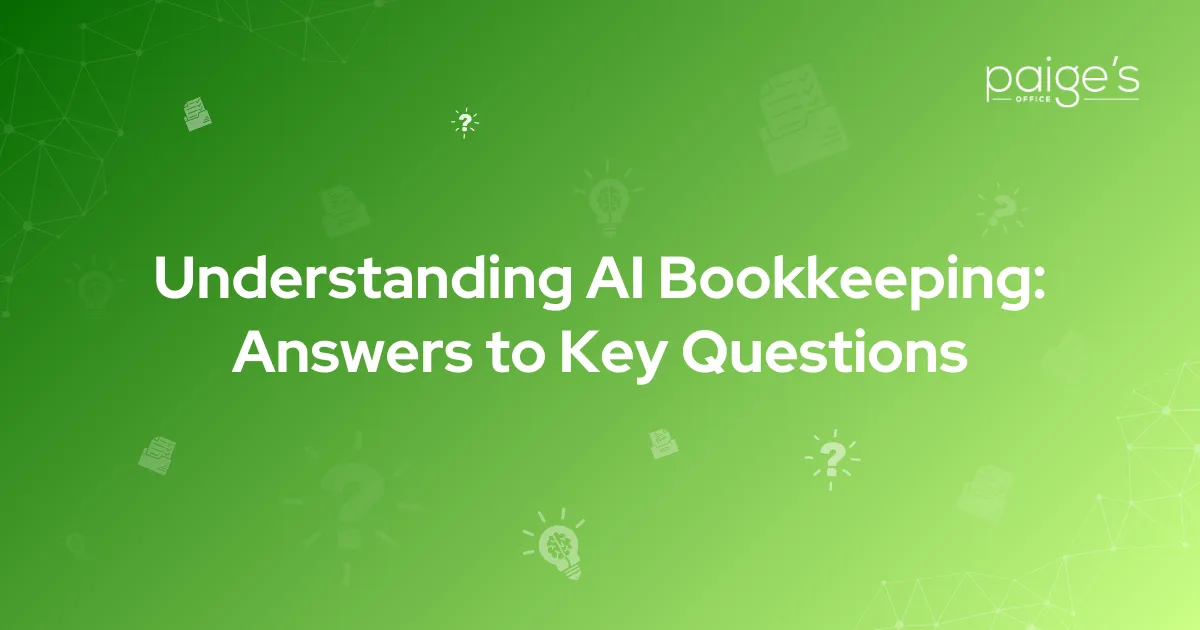
Understanding AI Bookkeeping: Answers to Key Questions
Nobody likes how taxing manual bookkeeping can get. You're juggling stacks of receipts, reconciling bank statements, and sifting through countless transactions, all while trying to keep your sanity intact. Even when you focus and pay a great deal of attention, mistakes occasionally occur. This chaos eats up your precious time, piles on stress, and leaves you wondering if your financial reporting is accurate.
Sure, there is a lot of talk of how AI bookkeeping helps lighten this load, sharpen accuracy, and offer you back some of that time, but there are some questions. To help with that, we’ve included some answers to the burning questions that bookkeeping professionals like you often have about using AI in your everyday routines.
So, What Is AI Bookkeeping, Anyway?
Artificial intelligence in bookkeeping is all about using smart software to automate those traditional bookkeeping tasks you might be familiar with (like jotting down transactions, sorting expenses, and matching bank statements). It learns from its financial history to improve its performance over time. So, the AI can sift through various data sources, pair invoices with their corresponding payments, and even flag any discrepancies.
It aims to reduce errors, save you valuable time, and keep you informed with up-to-date financial information without replacing bookkeepers.

Can AI Really Replace Human Bookkeepers?
Intelligent bookkeeping isn’t about sending your human bookkeeper packing; instead, it’s like having a super handy assistant. Sure, it can take care of those menial tasks like data entry, but it allows humans to take the reins when it comes to strategic insights and compliance.
AI might handle a whopping 80-90% of the routine processes, but it still needs a human to ensure everything’s running smoothly. Bookkeepers will find their worth increasing as they interpret the AI’s reports, tackle anything the software flags, and offer tailored financial advice, shifting away from the mundane to the more strategic stuff.
What Kind of Tasks Can AI Automate?

AI is pretty phenomenal at making your life easier by automating a range of bookkeeping tasks, such as:
Sorting income and expenses based on their learned patterns
Reconciling bank transactions with payments and invoices
Generating invoices and sending reminders sans your input
Spotting any duplicate or shady transactions
Keeping your financial records up to date in real-time
Anticipating cash flow trends from payment behaviors
Managing conversions in multi-currency scenarios
Whipping up preliminary financial reports for you to review
By taking care of these repetitive tasks, AI helps keep your finances tidy and ready to go without breaking a sweat.
How Reliable and Secure Is AI Bookkeeping?
Accuracy hinges on the quality of the data it learns from, plus its ability to keep improving over time. The best AI systems boast accuracy rates above 95% for sorting transactions and matching them up. With those machine learning algorithms in play, you can bet they’re only getting better!
Security is another important piece. Top-notch AI tools stick to data protection rules, guaranteeing encrypted data sharing, secure cloud storage, and strict access controls. Plus, they create audit trails so you can see what’s been done and when. Still, don’t forget that a human needs to keep an eye on the outputs to ensure everything remains accurate.
How Does AI Tackle Complex Transactions?
Handling the tricky bits, like multi-currency transactions and duplicate invoices, is where AI shines. AI-powered bookkeeping automatically uses up-to-date exchange rates to track gains and losses, managing everything seamlessly across various international payment platforms. Plus, it can catch repeats or inflated invoices by flagging suspicious submissions, even if they come in with slightly altered vendor names. By stepping in as a financial watchdog, AI can alert you to issues before they turn into bigger problems.
What Should You Look For in AI Bookkeeping Tools?

When it's time to pick out the right Automated bookkeeping software, keep an eye out for these must-have features:
Smart categorization that keeps improving thanks to machine learning
Smooth integration with your bank accounts and payment processors
Ability to handle multi-currency needs with real-time updates
Automated invoice management from creation to reminders
Solid reconciliation tools ready to catch errors
Strong security and compliance, plus detailed audit trails
User-friendly dashboards that give you the financial insights you want
Options for scalability and customization to meet your unique needs
Choosing a solid, efficient tool will give you the biggest bang for your buck when it comes to optimizing your workflows and maintaining accurate financial oversight.
Final Thoughts
Grasping these core questions about bookkeeping with AI equips you with the knowledge to explore and implement these exciting advancements with confidence!

